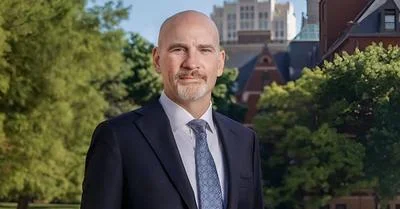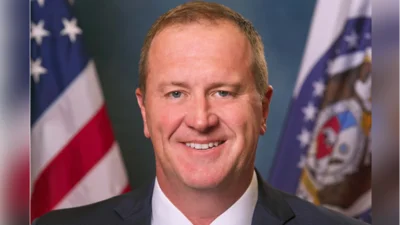Jack Kalavritinos | APCO Worldwide
Jack Kalavritinos | APCO Worldwide
A former official with the U.S. Department of Health and Human Services (HHS) said the federal 340b drug discount program is a reminder of "abuse and waste" that exists in Washington, D.C.
At least 84 Missouri hospitals participate in 340b, according to 340bHealth.
"The 340B program is just one of many reminders of the abuse and waste and that exists in Washington, D.C.," Jack Kalavritinos, founder of the Washington Health Innovation Council, wrote in a RealClearHealth op-ed. "When well-intentioned government programs are abused and stray far from their original purpose, our elected officials owe it to us to step in and fix the problem.
"And that’s where we are with 340B," he wrote.
The op-ed asked the Trump Administration's Delivering on Government Efficiency (DOGE) initiative to "check out 340b and where the money is going."
Kalavritinos' op-ed comes a month after two health analysts also said DOGE should "look no further than the 340b drug discount program' in the department's efforts to "overhaul government spending."
"In 2025, Elon Musk and the proposed Department of Government Efficiency (DOGE) is poised to fundamentally overhaul government spending," wrote Anthony DiGiorgio and Kirsten Axelsen in RealClearHealth. "They should start with healthcare, where even obscure programs carry multi-billion-dollar price tags for taxpayers. Look no further than the 340B drug discount program."
"This program, designed to give safety-net hospitals a discount on high-priced pharmaceuticals, has grown out of control," wrote DiGiorgio and Axelsen. "No longer serving the intended purpose of assisting low-income patients access to medications, it raises drug prices for all Americans. Moreover, it is managed by a complex bureaucracy that the investigators in the federal government have found unable to manage the program."
DiGiorgio is an Assistant Professor in both Neurological Surgery and the Philip R Lee Institute for Health Policy Studies at The University of California San Francisco. Axelsen is a non-resident fellow with the American Enterprise Institute.
Established in 1992 and administered by the Health Resources and Services Administration (HRSA) the program aims to provide financial relief to healthcare providers serving vulnerable populations, allowing them to stretch their scarce resources and reach more eligible patients.
Hospitals participating in the 340B program can use the savings to fund essential services and programs, such as free or low-cost medication assistance, expanded access to healthcare, and community outreach initiatives.
Participating hospitals, however, “often extend their 340B discounts to clinics in well-off communities, where they can charge privately insured patients more than those on Medicaid,” reported the Wall Street Journal.
“In some cases, the program appears to be bolstering profits in well-off areas more than it is underwriting services in less-privileged neighborhoods,” said the Journal article.
DiGiorgio told Empire State Today in March 2024 that he sees a "potential for abuse" in the program.
“The hospitals often buy these drugs at the 340b discount and then resell them to Medicare and private insurance through independent pharmacies,” DiGiorgio said. “They charge Medicare and private insurance much more than the discounted price, reaping huge revenues.”
DiGiorgio said the program “makes no provisions requiring that the discounts be passed on to patients,” and there are also “no provisions that those revenues go back to charitable care, either.”
“The hospital can use that money for whatever it wants," he said. “This potential for 340b abuse has led hospitals to contract with pharmacies in wealthy areas and acquire independent clinics in these wealthy areas as well.”
An analysis published last year by Dan Crippen, the former director of the Congressional Budget office, estimated the 340b program reduces state and local tax revenues by $3.5 billion annually, on top of reductions in federal tax revenue
"Even at current levels, the 340b Program results in a large transfer of taxable income to non-profit entities," Crippen wrote. "As a result, last year alone, federal and state tax revenues were reduced by as much as $17B."
"The value of the 340b discounts is estimated to be $70 billion last year alone," said Crippen. "When state and local taxes are included in the calculation, the average combined tax rate for pharmaceutical manufacturers is roughly 25 percent. The addition to the tax rate results in a possible reduction of state and local tax revenue by $3.5B per year."





 Alerts Sign-up
Alerts Sign-up